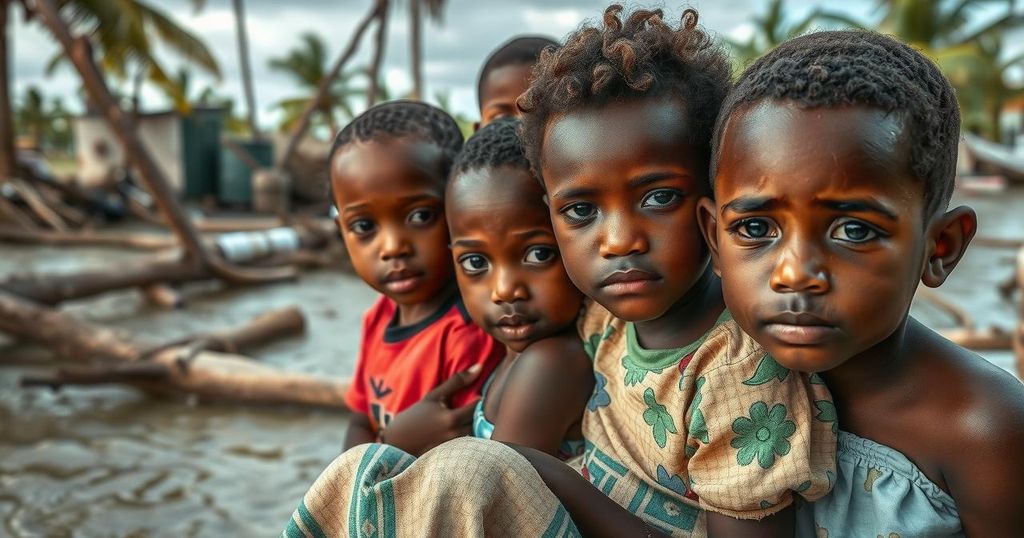Tropical Cyclone Chido severely impacted northern Mozambique, affecting 90,000 children and destroying 35,000 homes in Cabo Delgado province. The cyclone exacerbated existing crises marked by a prolonged conflict, health emergencies, and educational facility destruction, prompting an urgent humanitarian response from UN agencies and local partners.
Tropical Cyclone Chido unleashed catastrophic impacts across northern Mozambique over the recent weekend, culminating in significant damage particularly within Cabo Delgado province. Initial assessments reported that the cyclone compromised over 35,000 homes, forced thousands into displacement, and profoundly affected around 90,000 children, as reported by the United Nations Children’s Fund (UNICEF).
The cyclone not only damaged residential structures but also saw the destruction of at least 186,000 educational facilities, as 20 health clinics were rendered inoperable following the storm’s landfall near the city of Pemba. The storm’s aftermath reveals that in total, approximately 174,000 individuals suffered from its effects, though further assessments may yield increased figures.
Mary Louise Eagleton, UNICEF Representative in Mozambique, emphasized, “Mozambique is considered one of the most affected countries in the world by climate change, and children were already experiencing several life-threatening emergencies before Cyclone Chido, including conflict, drought, and disease outbreaks.”
The enduring conflict within Cabo Delgado has displaced over 1.3 million residents—predominantly women and children—compounding the adversities faced by the communities. The storm exacerbated an already volatile situation, destroying limited resources that had been painstakingly rebuilt. Additionally, Cyclone Chido impacted surrounding provinces of Nampula and Niassa, leaving over 25,000 families without electricity and damaging crucial water facilities at a time when health resources were already strained by a cholera outbreak.
Emergency responses are underway with agencies like the United Nations’ refugee agency, UNHCR, swiftly providing essential aid. More than 2,600 affected individuals received crucial emergency supplies in Pemba shortly after the cyclone. Preliminary assessments indicate that about 190,000 people require urgent humanitarian assistance, including significant damage to local schools and homes. UN Secretary-General António Guterres affirmed that UN teams are actively engaged in delivering emergency aid and are poised to expand their support as conditions dictate.
Due to the limited resource availability impacting response efforts, Emergency Relief Coordinator Tom Fletcher allocated $4 million to assist Mozambique’s early humanitarian response. The World Food Programme (WFP) anticipates the food insecurity crisis to affect nearly 3.3 million individuals in the year ahead, pledging to amplify efforts to assist those severely impacted by the cyclone. Further devastation was also noted in Mayotte and southern Malawi, where the cyclone led to fatalities and infrastructural damage, necessitating continued monitoring and coordination from UN agencies in the region.
Tropical Cyclone Chido posed severe risks to Mozambique, an area already grappling with multiple crises. Climate change significantly impacts the region, and the population has been resilient despite enduring conflicts, droughts, and health emergencies. Cyclone Chido arrived on the heels of several years of turmoil, heightening the need for immediate humanitarian assistance. As UN organizations coordinate their efforts, the disheartening reality remains for millions facing challenges exacerbated by natural disasters and ongoing socio-economic instability.
In conclusion, Cyclone Chido has inflicted devastating consequences in northern Mozambique, critically affecting over 90,000 children and displacing thousands more. With significant structures destroyed, the immediate need for humanitarian assistance is pressing. Collaborative efforts from UN agencies and local organizations aim to provide relief; however, the ongoing crises amplify the urgent need for sustained support to restore lives affected by this recent calamity.
Original Source: news.un.org







